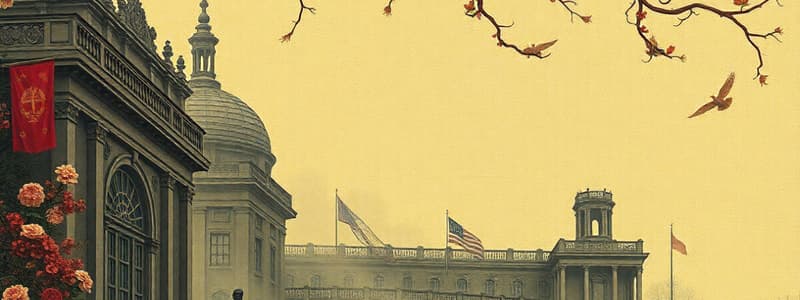Podcast
Questions and Answers
What event significantly increased tensions leading to WWI?
What event significantly increased tensions leading to WWI?
- The annexation of Bosnia by Austria
- The signing of the Treaty of Versailles
- The sinking of the Lusitania
- The assassination of Archduke Francis Ferdinand (correct)
Which of the following was NOT one of the four main reasons for the outbreak of WWI?
Which of the following was NOT one of the four main reasons for the outbreak of WWI?
- Imperialism
- Nationalism
- Militarism
- Colonialism (correct)
What was a direct consequence of the Treaty of Versailles for Germany?
What was a direct consequence of the Treaty of Versailles for Germany?
- An increase in territorial holdings
- Reduction of their military capabilities (correct)
- Formation of the League of Nations
- Restoration of Alsace-Lorraine to Germany
How did American involvement in WWI economically benefit the United States?
How did American involvement in WWI economically benefit the United States?
What was one of Germany's promises post-WWI as a reaction to the Treaty of Versailles?
What was one of Germany's promises post-WWI as a reaction to the Treaty of Versailles?
Which plan outlined Germany's strategy for fighting in WWI?
Which plan outlined Germany's strategy for fighting in WWI?
What was a result of the Balkan unrest prior to WWI?
What was a result of the Balkan unrest prior to WWI?
What triggered Russia's involvement in WWI?
What triggered Russia's involvement in WWI?
Which countries were part of the Triple Entente?
Which countries were part of the Triple Entente?
What was a significant feature of militarism prior to World War I?
What was a significant feature of militarism prior to World War I?
Which of the following weapons was NOT commonly used during World War I?
Which of the following weapons was NOT commonly used during World War I?
What does the term 'total war' refer to?
What does the term 'total war' refer to?
Which concept describes stronger countries taking control of weaker ones?
Which concept describes stronger countries taking control of weaker ones?
Which event directly involved Germany attacking other nations at the beginning of World War I?
Which event directly involved Germany attacking other nations at the beginning of World War I?
What was a characteristic of the alliances formed prior to World War I?
What was a characteristic of the alliances formed prior to World War I?
Which statement best describes conscription during World War I?
Which statement best describes conscription during World War I?
What was one consequence of high tariffs during the global economic conditions of the time?
What was one consequence of high tariffs during the global economic conditions of the time?
Which factor significantly contributed to the political landscape in Europe during the economic downturn?
Which factor significantly contributed to the political landscape in Europe during the economic downturn?
What was one effect of the global economic depression on employment?
What was one effect of the global economic depression on employment?
What happened to women’s roles in the workforce during this period?
What happened to women’s roles in the workforce during this period?
Which revolutionary movement took place in the countries mentioned during the global unrest?
Which revolutionary movement took place in the countries mentioned during the global unrest?
What was a notable characteristic of Stalin’s regime during the period described?
What was a notable characteristic of Stalin’s regime during the period described?
How did the New Deal respond to the economic challenges of its time?
How did the New Deal respond to the economic challenges of its time?
Who was a notable fascist leader that actively worked to eliminate his opponents?
Who was a notable fascist leader that actively worked to eliminate his opponents?
What was a key factor in the rise of totalitarian states in the early 20th century?
What was a key factor in the rise of totalitarian states in the early 20th century?
Which leader ended Russia's involvement in World War I?
Which leader ended Russia's involvement in World War I?
What was one outcome of the Mexican Revolution?
What was one outcome of the Mexican Revolution?
What characterized Stalin's approach to leadership in the Soviet Union?
What characterized Stalin's approach to leadership in the Soviet Union?
Which group faced repression under Stalin's regime?
Which group faced repression under Stalin's regime?
What was a significant social movement in China during the early 20th century?
What was a significant social movement in China during the early 20th century?
Which outcome was NOT a result of the global revolutions discussed?
Which outcome was NOT a result of the global revolutions discussed?
What was the primary focus of the fascist regimes in Italy and Germany?
What was the primary focus of the fascist regimes in Italy and Germany?
Which event marked the abdication of the Russian Tsar?
Which event marked the abdication of the Russian Tsar?
What common issue drove revolutions in early 20th century Latin America?
What common issue drove revolutions in early 20th century Latin America?
Flashcards
Militarism
Militarism
The glorification of war and the military, leading to increased army size, influence of military leaders, and widespread conscription.
Conscription
Conscription
Compulsory military service, where citizens are required to join the army.
Triple Entente
Triple Entente
An alliance between Russia, France, and Great Britain formed before World War I.
Triple Alliance
Triple Alliance
Signup and view all the flashcards
Imperialism
Imperialism
Signup and view all the flashcards
Total War
Total War
Signup and view all the flashcards
Trench Warfare
Trench Warfare
Signup and view all the flashcards
New Weapons of WWI
New Weapons of WWI
Signup and view all the flashcards
High Tariffs
High Tariffs
Signup and view all the flashcards
Worldwide Depression
Worldwide Depression
Signup and view all the flashcards
New Deal
New Deal
Signup and view all the flashcards
Fascism
Fascism
Signup and view all the flashcards
Treaty of Versailles
Treaty of Versailles
Signup and view all the flashcards
Nazi Party
Nazi Party
Signup and view all the flashcards
Totalitarian State
Totalitarian State
Signup and view all the flashcards
Gestapo
Gestapo
Signup and view all the flashcards
Nationalism's Impact on WWI
Nationalism's Impact on WWI
Signup and view all the flashcards
Imperialism's Role in WWI
Imperialism's Role in WWI
Signup and view all the flashcards
Militarism in WWI
Militarism in WWI
Signup and view all the flashcards
Alliances in WWI
Alliances in WWI
Signup and view all the flashcards
Causes of WWI
Causes of WWI
Signup and view all the flashcards
Impact of WWI on the Economy
Impact of WWI on the Economy
Signup and view all the flashcards
The 1920s: Shaped by WWI
The 1920s: Shaped by WWI
Signup and view all the flashcards
Nationalism
Nationalism
Signup and view all the flashcards
Propaganda
Propaganda
Signup and view all the flashcards
Rise of Fascism
Rise of Fascism
Signup and view all the flashcards
Economic Depression
Economic Depression
Signup and view all the flashcards
Mexican Revolution
Mexican Revolution
Signup and view all the flashcards
Russian Revolution
Russian Revolution
Signup and view all the flashcards
Stalin's Rule
Stalin's Rule
Signup and view all the flashcards
Chinese Revolution
Chinese Revolution
Signup and view all the flashcards
Causes of 20th Century Revolutions
Causes of 20th Century Revolutions
Signup and view all the flashcards
Study Notes
World War I: Descent into the Abyss
- Militarism: Increased military spending and influence of military leaders, conscription widespread.
- Alliances: Complex system of treaties between nations (Triple Entente and Triple Alliance) created a domino effect for conflict, leading to increased tensions.
- Imperialism: Competition among nations for colonies and resources.
- Nationalism: Strong national pride and competition among countries fueled tensions.
- Assassination of Archduke Franz Ferdinand: Sparked the immediate conflict by Austria-Hungary declaring war on Serbia.
- Military Technology: Modern advancements like machine guns, poison gas, and submarines changed warfare drastically, leading to stalemate.
- Total War: Complete mobilization of resources and populations of the countries participating in the war.
- US Involvement: Entered the war in 1917, significantly contributing to Allied victory.
Causes of World War I
- Militarism: Glorification of military strength led to intense competition in military buildup among nations.
- Alliances: Formal and informal agreements between nations created a complex system, where an attack on one member often drew others into the conflict.
- Imperialism: Struggle for control of colonial possessions and resources increased tension.
- Nationalism: Strong national identity and rivalry between different nations led to mistrust and conflicts.
Key Events and Developments
- Germany's Attacks: Germany initiated attacks on various countries, including Belgium and France, to gain advantage in the war.
- Technology in Warfare: New military technologies like machine guns, poison gas, and submarines revolutionized how wars were fought, leading to trench warfare.
- Stalemate: A prolonged period of little to no progress on the battlefield, often marked by trench warfare.
- US Entry into WWI: The US entry in 1917 significantly contributed to Allied victory by bringing in significantly more resources and troops.
- Treaty of Versailles: Treaty that ended WWI and imposed harsh penalties on Germany, contributing to future conflicts like WWII.
The Road to World War I
- Militarism: Glorification of military power and increased military spending.
- Alliance Systems: Complex treaties creating a chain reaction for conflicts.
- Imperialism: Competition for colonial possessions and resources increased tension.
- Nationalism: Fierce national pride created conflicts and rivalries.
WWI Aftermath
- US Entry: Significantly influenced the course of the war via contributions to resources and personnel.
- Treaty of Versailles: Harsh terms imposed on Germany, including reparations, limitations in the military, and loss of territories.
- Impact: The end of empires such as Austro-Hungarian, and Ottoman.
- Reparations: Germany had to pay for damages caused during the war.
Studying That Suits You
Use AI to generate personalized quizzes and flashcards to suit your learning preferences.




